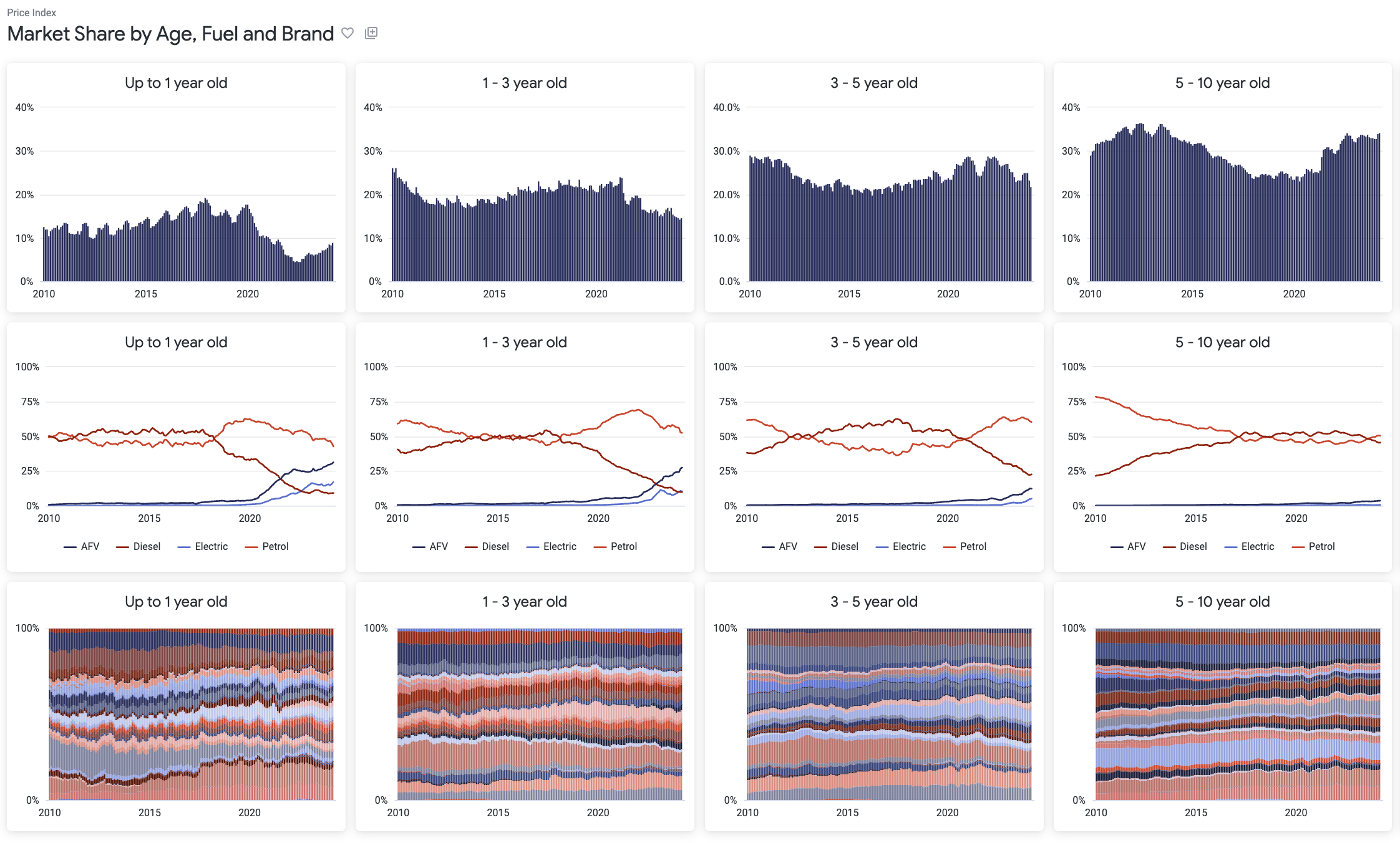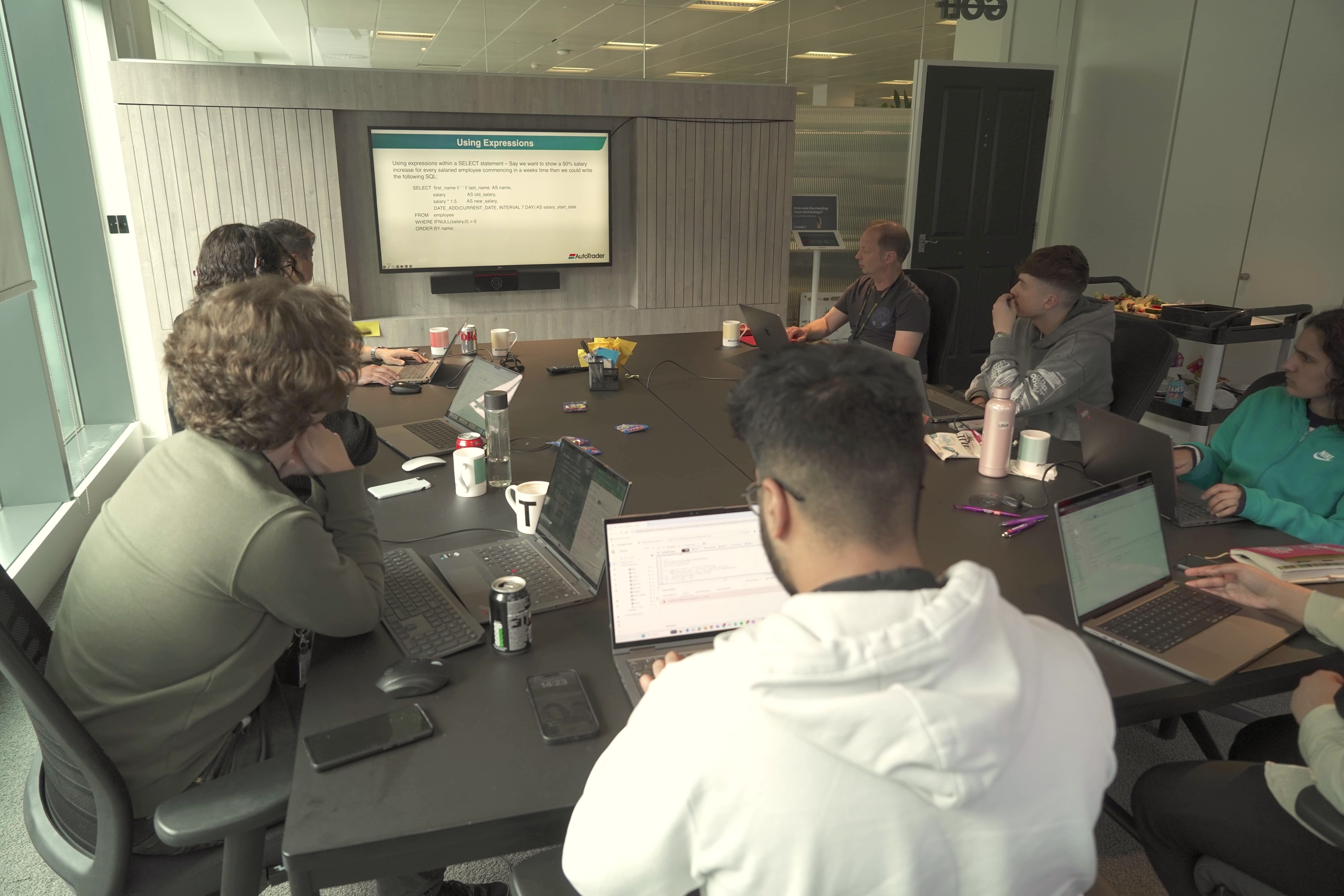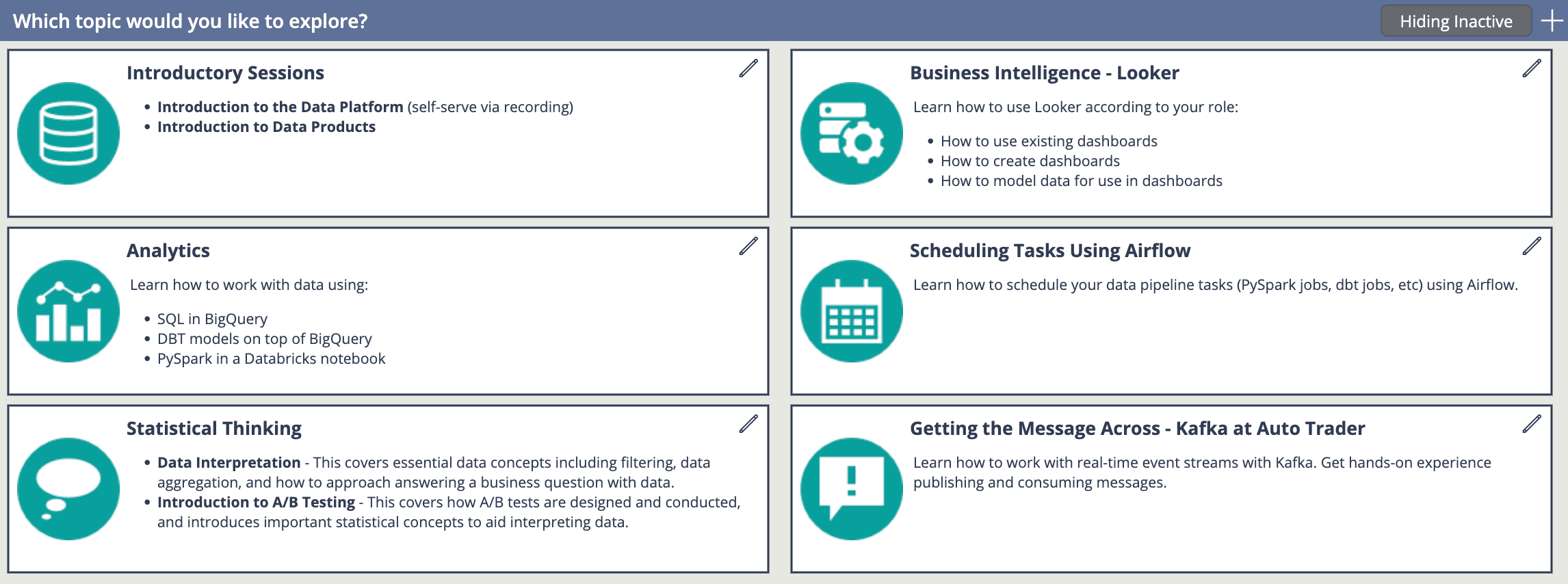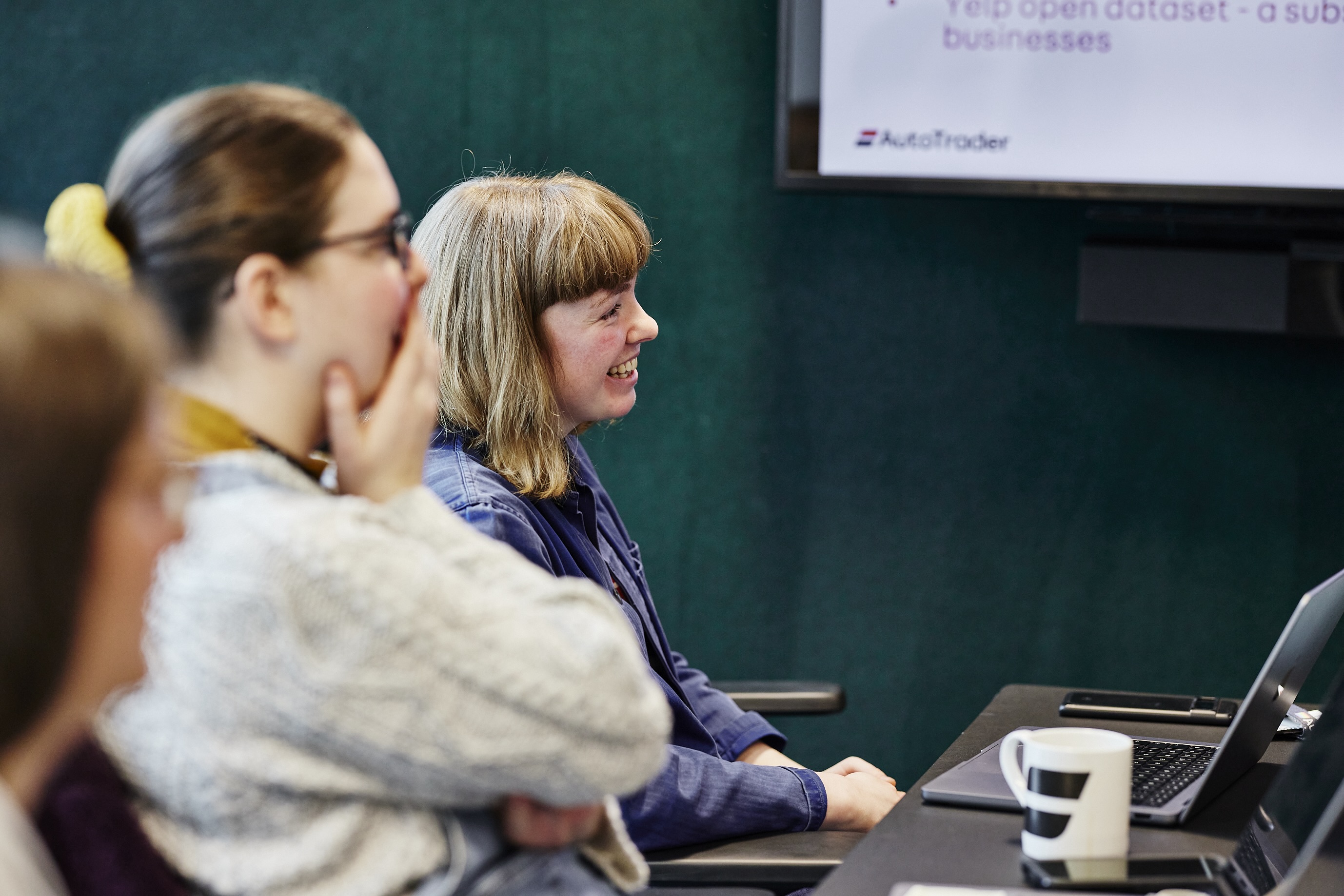Building a Data Academy - How we develop our data skills

Data underpins and helps to drive every part of Auto Trader’s business. With over half a million listed vehicles and 1.4 million visitors to Auto Trader per day, we have a uniquely large amount of data about the UK automotive marketplace, which is full of potential insights.
To work with that data at scale, we need enough people to know how use it in order to unlock its full value. Crucially, teams need the autonomy to help themselves to any relevant data and generate insights without having to rely on a centralised Data Engineering team. We are making good progress towards this goal. However, it is a careful balancing act between providing technical capabilities and teaching people how to use them.
We have had to ask ourselves:
- How can we onboard people into our rich data ecosystem?
- How can people effectively share their expertise?
- How can we give people confidence to use the tooling correctly?
To help achieve our aims, we have developed a suite of workshops under the umbrella of “Data Academy”. It has grown over time into a self-sustaining training function that gives people the knowledge and experience to work confidently with data using our platform tooling.
Read on to find out more about how our Data Academy operates, giving our colleagues autonomy over their data and reducing time to insight.
The Problem
The vast amount of data Auto Trader collects about the UK automotive marketplace empowers us to deliver valuable insights to a range of people, from Auto Trader itself, to our customers and the wider public. A few examples include:
- delivering market information to the Office of National Statistics
- reporting to sellers on the performance of their advertisements
- using machine learning to help people make decisions about the vehicles they are buying or selling
For fast delivery of new insights and to take full advantage of domain expertise, we need teams to own the data they produce. They need to model the data and make it available in an appropriate format for other teams to use without having to depend on a central data team. Other teams in turn need to be able to combine data from various sources to build further data and insights. This requires data skills to be embedded in all of these teams.

A dashboard showing market share insights, an example of how we use data skills to derive insights
We are working at the cutting edge of data technologies and our Data Platform aims to make them available in a consistent way that is easy to understand and use. This is a work in progress and probably always will be. However easy we try to make it, people will always need to learn how to use the tools provided.
A lot of our training at Auto Trader takes place informally within teams as we need it. We like this but it does have some limitations:
- Duplication of effort
- It can be more efficient to dedicate time to training several people at once.
- People training together can help each other and learn from each other’s questions.
- Inconsistency
- Team members may not have sufficient knowledge to pass on.
- Colleagues with other commitments might not have enough time to give full, in-depth explanations.

Our Solution - the Data Academy
To solve this problem, we set out to create a training function for new starters and those looking to pick up new data skills.
We offer a mixed portfolio of high-level introductory courses and courses that give a deeper dive for those in more technical roles. Sessions can be in whatever format best suits the course: classroom-based learning, remote learning, or self-serve video.
Key features are:
- Courses are modular.
- People can pick and choose what they need for their role.
- Some topics have a series of courses so people can expand their knowledge of an area as they require.
- Hands-on practice in a low-stakes context.
- Training is specific to Auto Trader. Online tutorials may teach basic concepts of the technology, but might not teach how we actually use it in practice.
We started with a small team of people offering a few courses that covered some core topics. This has evolved into a flexible, sustainable model that can change when needed, to keep it fresh and relevant.
The Data Academy has become a huge success and now provides over 15% of the internal training at Auto Trader. Feedback from attendees tells us they value the training and find it helpful.

Data Academy offers a range of topics to help people meet their development needs
How does it work?
Courses
Ideas for new courses come from within the Data Academy, from feedback on existing courses or from outside as people notice areas where some more formal training would help.
People
We are Data Analysts, Data Scientists, Software Developers and Insight Specialists, and our day-to-day priorities are elsewhere. Creating a course, running it and keeping it up to date with our evolving data platform takes time and commitment from members of the Data Academy, together with support from their managers and teams they usually work in. We had to think carefully about how to make a data academy self-sustaining so that we can offer people the training they want while keeping the load on the trainers manageable.
The trainers are experts in their fields or recent learners who understand where people might struggle. They use the tools and techniques they are teaching; they are familiar with the pitfalls and know tricks to use the tools more effectively. Importantly, they are interested in the area they cover and enjoy what they are doing.
There are benefits for trainers too. Giving training is an opportunity for personal development: it enables people to practice a whole range of transferable skills and to meet other people from across the business with a common interest in what they are teaching.
Keeping it fresh
As time goes on and roles change, the people who originally developed a course may move on and hand over to other people. Course owners are free to make whatever changes to the courses they think are needed – they are the experts and the Data Platform and its tools are continually evolving.
We ask for feedback at the end of every session and often tweak the course content and exercises in response.
Team effort
The Data Academy really is a team effort. We support each other with a Slack channel and a short monthly meeting where people can share new ideas, talk about any problems, and ask for help. Of course, we don’t need to wait for a meeting to talk to each other; we do it anyway.

What we have learnt
Some of the things we have learnt over the course of our Data Academy journey so far are:
- Natural growth and evolution has served us better than a top-down approach. We have found ourselves working more collaboratively and we benefit from thoughts and ideas from a wider pool of people. It allows us to offer courses as people become interested in creating and giving them and gives us the flexibility to create new courses when there is demand.
- The advantages of being together - We found that it is more difficult to engage with and support workshop participants when we are not in the same room, and it is harder for learners to help each other. In particular, hybrid sessions (with some people in the room and some joining remotely) did not work very well. However hard the trainers try to be inclusive, there is always risk that remote learners will feel left out or forgotten about, which we only really mitigated by having at least one trainer working remotely, dedicated to supporting remote participants throughout each workshop. We much prefer to have everyone together in a room where possible, or fully remote if necessary.
- The value of feedback - Continuous development of our workshops helps keep our content up-to-date and relevant in an Auto Trader context, but it’s the feedback from our learners that helps us meet the needs of our target audience(s). We actively seek, welcome and act on feedback about all aspects of workshop delivery.
Finally, we owe huge thanks to our trainers for their hard work and dedication over the years, as well as to our workshop attendees for their participation and feedback that has helped make Data Academy the self-sustaining success it is today.
Enjoyed that? Read some other posts.





